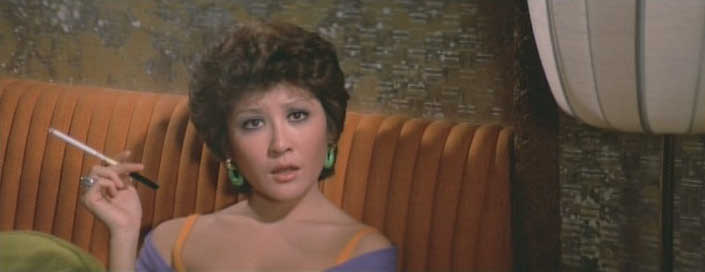Bruce Lee and I
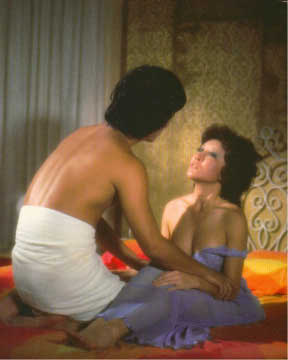
Director: John Law Ma
Year: 1976
Rating: 5.0
With his role as
Kato in the “Green Hornet” series and his riveting cameo in “Marlowe”, Bruce
Lee had already become a major celebrity in Hong Kong by the late 1960’s.
After his disappointment at not getting the lead role in the television series
“Kung Fu” (what value would that series have today I wonder if Bruce had
starred?), he returned to the place where he had been a child star nearly
a decade before. Martial arts films (generally of the wuxia variety) were
booming in Hong Kong at the time with the Shaw Brothers in particular being
the prime driving force behind this. So it made sense for Bruce to approach
this company to see what sort of deal he could work out, but the Shaw’s were
not willing to give Bruce the salary he wanted (a reported offer of $2,000
per film) nor the opportunity to make the kind of films he wanted. So Bruce
turned to the newly found upstart company Golden Harvest run by a Shaw deserter,
Raymond Chow, and was able to get what he was looking for – the independence
to make his own films. A case could be made that this was the first major
cut in the hide of the Shaw Brothers that would lead eventually to their demise
as a film company. The success of the four films that Bruce made for Golden
Harvest established them as the major competitor to the Shaw’s and by the
early 80’s they were the dominant film company in Hong Kong.
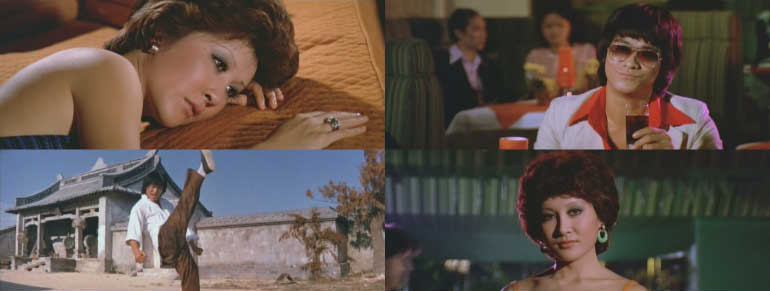
Two years after Bruce’s death, the Shaw’s attempted to get some modicum of
revenge by releasing this squalid squirrelly film that supposedly details
the last days in his life. His sudden death has engendered numerous conspiracy
theories from being killed by the triads or the Mafia to death by his over
use of drugs – though the official cause of death was a brain edema. This
film plays it both ways, but in general it paints a rather negative portrait
of the superstar as an obsessive jealous lover with a hair trigger temper
that edged him towards psychosis. Over the years this film has become somewhat
infamous in its various forms (re-edited for foreign consumption with titles
like “Bruce Lee: His Last Days, His Last Nights”) for its sleazy content
and the chutzpah of its female lead. In the end though perhaps most insulting
to the memory of Bruce Lee is that the film just isn’t very good on any level
– it contains way too much dull weepy melodrama to be an enjoyable exploitation
film and there is not enough Bruce for Bruce fans. Its one redeeming factor
other than watching it for its sheer brazenness is a solid impersonation
of Bruce by Danny Lee who has all of his character’s tics down perfectly
and doesn’t do a bad job in the action sequences either. If only the actress
could have gotten her character down better!
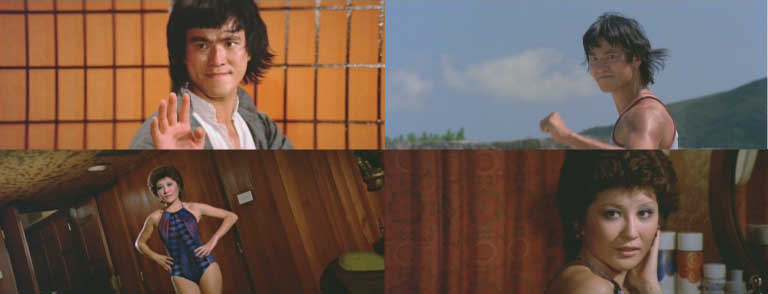
Bruce of course died in the apartment of Betty Ting Pei and so Shaw had the
brilliant PR idea to have this actress play herself in this film – not only
does she play herself but the entire film is presented from her supposed
point of view. Betty had been a moderately successful actress in the Shaw
stable during the late 60’s to the early 70’s and had co-starring roles in
films like “The Millionaire Chase”, “Apartment for Ladies” and “Yellow Muffler”.
Her film reputation was a bit naughty but she never became a star during
her Shaw days and by 1973 they had parted ways. She acted in a few other
films including some with Golden Harvest (“Stoner”, “Games Gamblers Play”
and “Naughty, Naughty”), before she returned to Shaw for this foray. Why
she would take on this role other than for money is a bit puzzling and perhaps
it was only for money or to regain some fame. After Bruce’s death, she was
often vilified in the press and hated by legions of Bruce Lee fans for bringing
shame on him and maybe she thought this was her opportunity to set the record
straight, but she emerges from this film with no respectability as she is
portrayed as little more than a high class escort and gambling addict and
certainly the manner in which Bruce is portrayed did little to endear her
to his fans. After her career was over though she did quite well for herself
by marrying the wealthy film producer Charles Heung – and after their divorce
she is rumored to have become a nun!
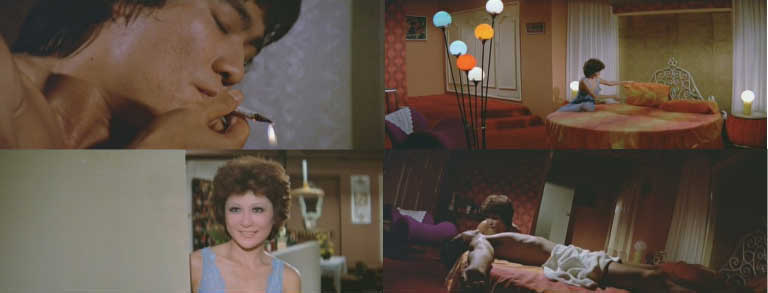
The film begins in true cheese fashion with Betty walking on the beach at
sunset mourning Bruce with a choir of heavenly voices singing in the background
and her telling him “I wish you could rest in peace”. The film rapidly devolves
into a salacious flashback of her and Bruce nude in bed (though her naked
breasts are clearly being doubled), him toking furiously on pot and popping
pills after which she showers to come out and find him dead. She calls Raymond
Chow (a very good look-alike) and tells him the bad news and the house falls
in on her. But that was only the press version as it turns out. Hounded by
the media, shunned by all and threatened by a gang of nunchuck wielding toughs,
she finds solace with a sympathetic bartender and tells him her side of her
life with Bruce Lee.
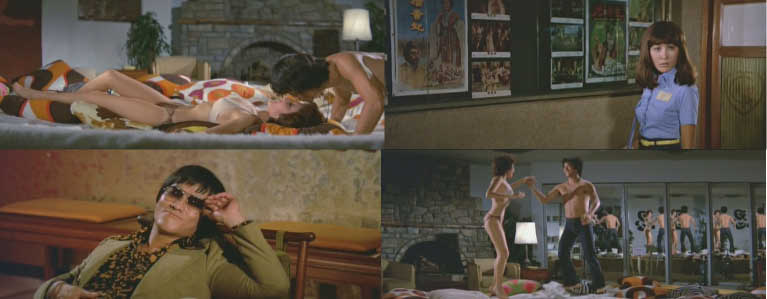
Poor little Betty – picked on by her schoolmates growing up and ignored by
her parents she is easy prey for a lecherous producer who fills her little
head with visions of stardom. When he tries to get her to double a nude scene
for an actress (and uses pictures of her taken after being drugged), she
runs away and leaves Taiwan for Hong Kong. There though she runs into this
producer again and is only saved by a mystery man who appears from nowhere
and kicks the crap out of her molesters and tosses money at her to get back
on her feet. Her feet though is not where she apparently spends her time
– on her back would be more apropos – soon she is swirling in a delirium
of men and money but won't be taken seriously as an actress – “they only
want me to do pornos” she proclaims sadly. A few years later she runs into
her rescuer again – now a famous star named Bruce Lee and he is immediately
taken by her but says he only wants to be friends as he has a wife. This
tease goes on – will they or won’t they – at one time it appears they will
as they both indulge in frantic foreplay by bouncing on a mattress and tossing
pillows at one another like a scene out of “Love American Style”, but again
the act is not consummated.
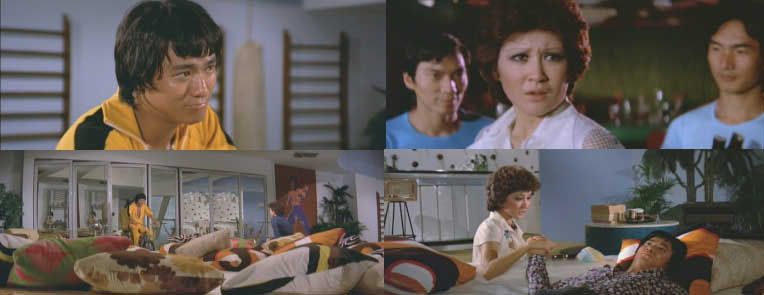
Poor Bruce. He is as horny as an alley cat – working on films during the
day (amusingly under the direction of Lo Wei who at one time is reading a
book while directing and at another time listening to the radio – he also
was an ex-Shaw Brother persona and they were no doubt taking a crack at him
as well as Raymond Chow on occasion) and looking for comfort at night. One
time a groupie gets into his apartment, but after getting naked he can’t
continue because . . . he can only think of Betty and his loins grow hungry.
She meanwhile is making merry with older wealthy men and spending her hard
earned loot in casinos and usually losing it. This torments Bruce who takes
to drink and fights and is falling apart. Finally, he persuades Chow to give
Betty the leading female role in his next film, “Game of Death” (apparently
a true fact) and he goes to her apartment to give her the good news. He gets
a headache and she gives him an aspirin. These final days of Bruce were also
relayed in a couple other trashy films - "Exit the Dragon, Enter the Tiger"
(1976) and 'Bruce Lee: A Dragon Story" (1974).
